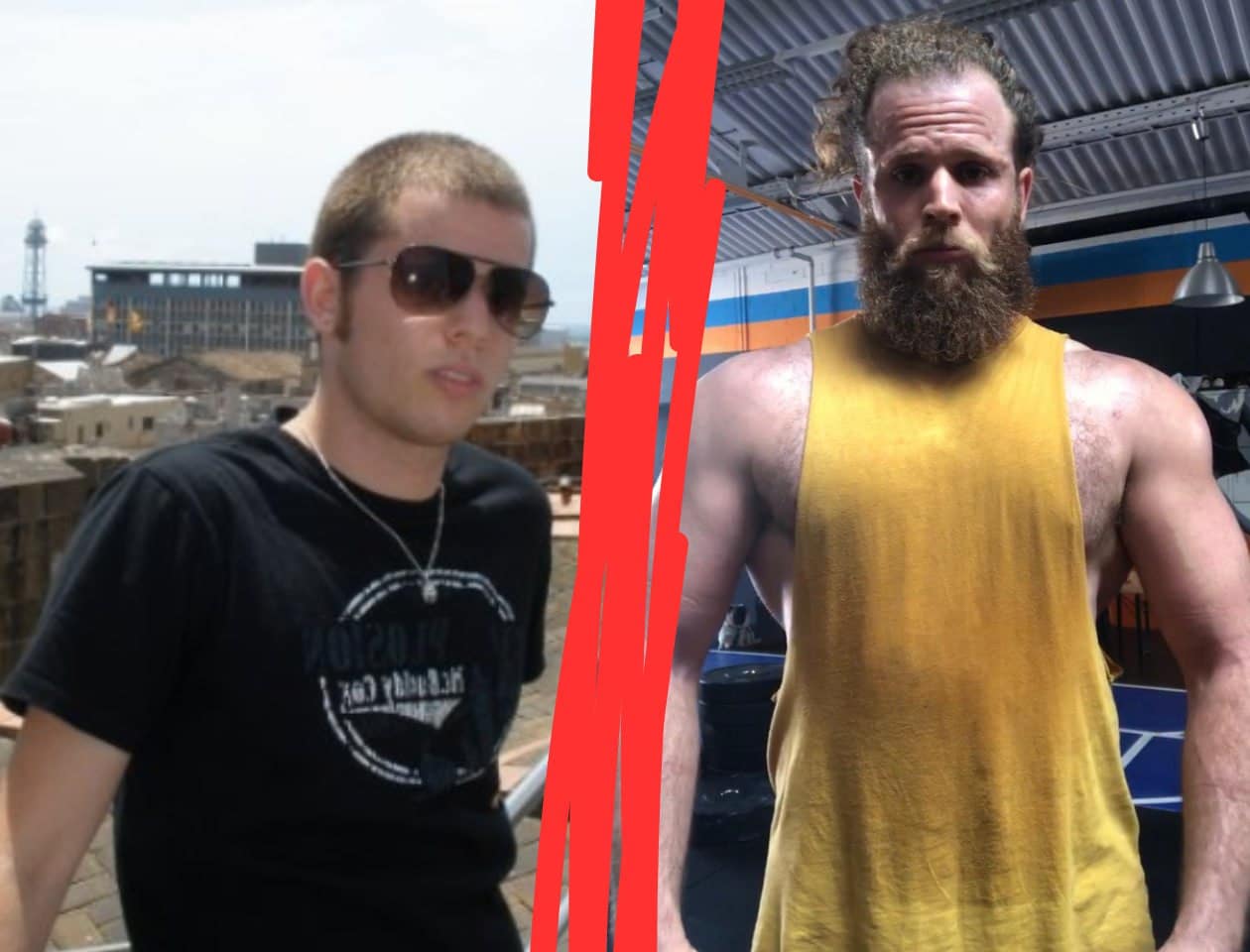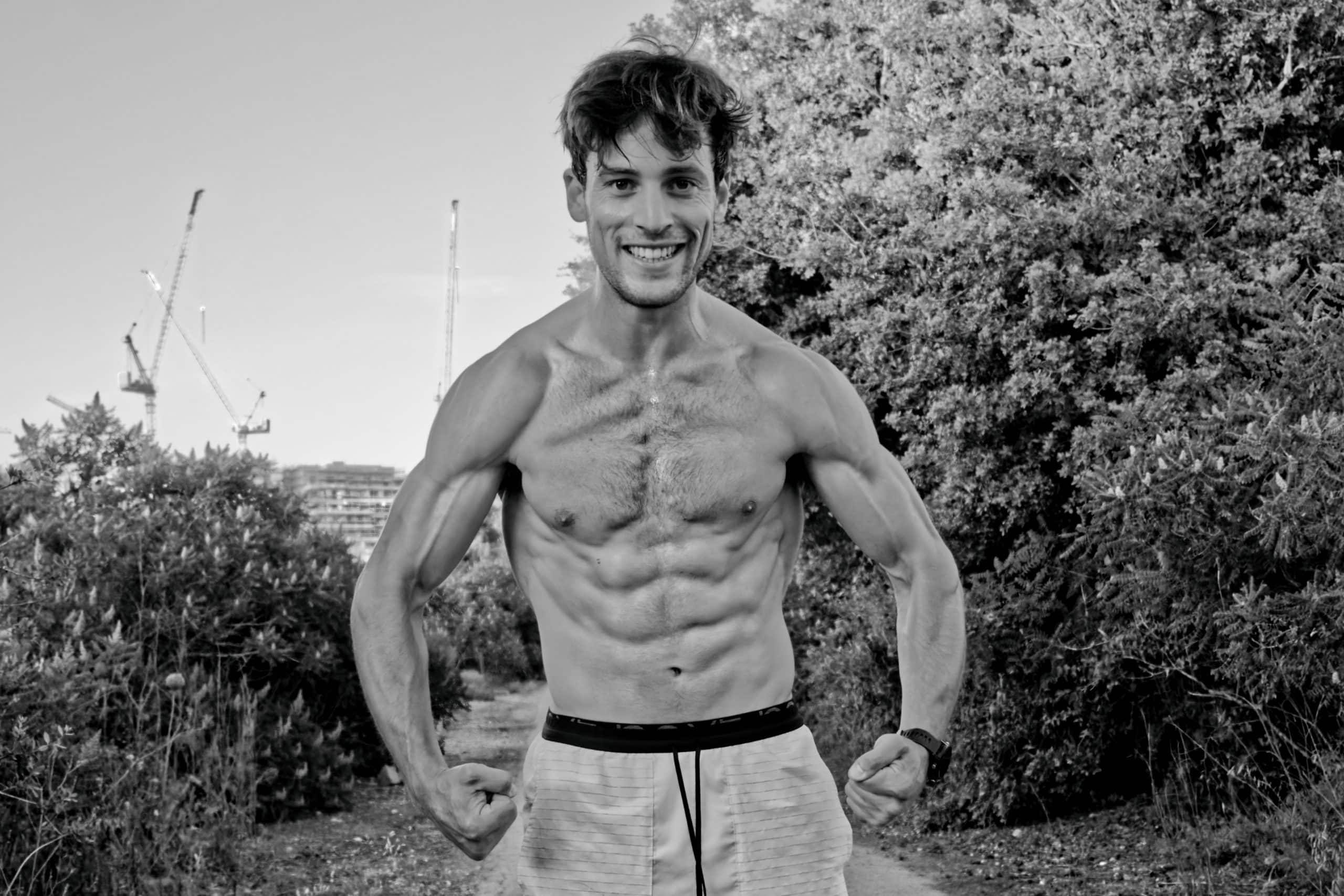
Red Fox’s Foreword about the Author
Coach Ari Cohen, featured in the testimonials section of this website, trained and stood alongside the head coach for several years, demonstrating exceptional curiosity and learning ability while developing his unique personal style. In recent years, he has become one of the top strongman competitors in Germany, balancing his time between training and his professional work in relationships, dating, and personal coaching.
I am very proud that Ari chose to contribute to Red Fox Athletics and know you will enjoy his content.
www.strengthinrelationships.com
I know, the title of this article sounds like an eighth-grade trigonometry lesson.
On the other hand, with the arrival of summer, there is one thing that casts its heavy shadow over all of us – a very important matter that undoubtedly keeps us awake at night and stresses some of us to our very core.
Of course, I am talking about taking off your shirt at the beach.
The preoccupation with one’s physical appearance has been a discussed topic for ages: from Miyamoto Musashi in Japan and Socrates in ancient Greece, to Cristiano Ronaldo in our days.

I would be lying if I said that my appearance isn’t important to me, and after nearly 13 years in the field, the question “How do I look in the mirror today?” is one of the most consistent questions in my life.
At the age of 21, when I left the army, I weighed 64 kilos. I was very thin, without any knowledge of nutrition or sports, bordering on eating disorders. My mind was filled with neurotic thoughts about my body. And I’m putting it mildly.
In fact, the situation was so bad that the first time I took off my shirt in public was at the age of 25, after 4 years of training, and even then I felt insecure.
Today, I am 34 years old, weigh 92 kilos, and as of 2023-24, I am the third strongest man in Germany in my weight category. I no longer look at the mirror with the same obsessiveness I had in my 20s, and I feel better about my body than I ever have. Even though I don’t have a six-pack.

Because I know that the life of a young athlete is not easy – you want to do everything: succeed in sports, make money, spend time with friends, and look good along the way.
Sometimes, it seems like there is so much to do that there is no time to precisely engineer the perfect diet or spend 90 minutes daily in the gym sculpting your trapezius and brachioradialis muscles.
In this article, I will try to provide you with general thought patterns that a young and busy athlete can easily follow, which will not only change your physical appearance but also your energy levels throughout the day and your thoughts about your appearance.
My hope is that after reading these lines, you will know not only what to eat but also how to regulate the stress surrounding the negative thoughts you have about your body and habits, allowing you to live a healthy lifestyle both physically and mentally.
I will start by saying that as of 2024, the general standard of the human body has changed a lot, mainly thanks to social media. When I open my Instagram, I am bombarded with videos and photos of various influencers, modeling under perfect lighting, each with biceps bigger than my head and veins that could shame a map of the Golan Heights.
Both men and women, born from the late 90s onwards, grew up with social networks in a kind of distorted symbiosis.
As a result, their worldview does not reflect current affairs; today, we think that six-pack abs, veins, a V-shaped body, huge chest, and 6% body fat are the “minimum” or the “basic” aesthetically, when in fact, this is the top decile of the human genome.
The retouched influencers we see daily on social media give the impression that every average male who goes to the gym has the body of a Greek god on steroids, and this message subconsciously seeps into our consciousness and partly causes our unrealistic expectations of ourselves.

Most of them use anabolic steroids or other prohibited substances.
Most of them use Photoshop to retouch their photos.
Most of them live around their appearance – which means diet, sleep, eating, and training habits that would not shame the senior SS officers in Germany of 1935.
Most of them represent a rare population group with exceptional genetic potential for relatively high muscle mass and relatively low body fat.
The clear conclusion is twofold:
If you lift your head from the phone and look around, even when you’re in a more “healthy” environment like a gym or in a group workout – you won’t see many people who look like that, or even close to it.
To look like that, the amount of attention, headaches, mathematical calculations, and work in the gym is astronomical. And it’s not a headache that a young guy focusing on a sports career can or wants to generally allocate.
In the words of Ronnie Coleman:
Everybody wants to be a bodybuilder, but nobody wants to lift heavy-ass weights
What Mr. Coleman hints at in this iconic statement is not that everyone wants to be bodybuilders (I understand that the average reader of this article has different aspirations), but that everyone wants something very difficult to achieve, but doesn’t want to put in the effort required to get there.
As an athlete focusing on soccer, basketball, football, or any other sport, it is logical and even desirable that you do not spend your best hours weighing every meal or doing 20 sets for shoulders in the gym.
Mathematics and Bank Accounts
“But Ari, witty, bearded, and amazing nutrition expert that you are,” you surely find yourself asking, “I’m sure, for example, that a player like Ronaldo doesn’t deal with the same things those bodybuilders deal with, and he looks good! I want to look like Ronaldo!”
To your question, I will answer and say that a player like Ronaldo certainly lives under a strict diet regime and works very hard to achieve his aesthetic goals.
I wouldn’t be surprised if Mr. Ronaldo has a personal nutritionist, a personal chef, and the best resources that his money allows him to maintain without the need for additional time investment.
But since we are already discussing Ronaldo, I will use his example to explain a simple principle that you need to understand to get the most out of this article:
If there is one thing I can say about Cristiano Ronaldo without reading more than an article and a half about him, it is that Cristiano adheres to a simple mathematical principle: he does not consume more calories than he expends.
I will briefly touch on calories and say that the most important tool for staying fit is knowing how many calories you consume daily versus how many calories you burn.
Think of it like a bank account: when expenses are low, and income increases, the account grows. And of course, the opposite is also true.
Although this article will not discuss calorie counting, it is very important to understand and internalize this principle, especially with all the false information running around the internet today.
It is very easy to find an article or a YouTube video talking about how intermittent fasting, the ketogenic diet, hormonal balance, butter coffee, or two flicks on your right ear are the only things that will make you lose weight.
Likewise, those radical pieces of information will tell you that “carbs are the devil,” “veganism is the answer,” or “no matter what, don’t touch bread.”
Friends, I will reflect on this matter in the most direct way possible:
If you are gaining weight, it is because you are consuming more calories than you are burning consistently, not because you drank one dark beer over the weekend with friends.
For example, if you noticed a new belly in January, you probably ate a bit too many doughnuts during Hanukkah, and as a result, your calorie intake increased.
If you do not want that belly to turn into a whole spare tire, it might be better to skip the daily doughnut and opt for a weekly doughnut instead.
So far, I have mentioned calories, a Nazi-like training regime, and Ronaldo, thus covering everything an average article for a typical football player would cover. Great.
Now that that’s behind us, I’ll get to the meat of the article:
What would you say if I told you there is a way you can look great in the mirror, feel energetic and vital, without living around the plate and scale all day?
Well, there is.
I will add that this way involves a bit of thinking, a lot of awareness, and a moderate amount of discipline.

I will try to provide you with three approaches that, when incorporated into your lifestyle, will not only allow you to look as close to Ronaldo as possible, especially if you don’t want a heavy dietary regimen, calorie counting, or a strict training routine that requires you to give up your social life and sleep in the gym, but also to feel better about yourself throughout the day, both physically and mentally.
So here you go – 3 general guidelines for six-pack abs:
If it didn’t exist 10,000 years ago, reduce it.
Let’s start, my well versed friends, with a basic understanding of the difference between two types of food: processed and whole.
Processed food is an umbrella term for any food that has undergone some form of processing by humans and as a result, differs from its natural state in nature.
In itself, this is not a bad thing – not all processed food is inherently evil.
For example, cheese is a processed food because its natural form is milk. By adding certain bacterial cultures to milk, humans “process” the milk and get a result different from its original form.
In this article, when I talk about “processed food,” I don’t mean it in the puritanical sense of the word.
I actually refer to a slightly more specific group of processed foods, commonly known as junk food, which includes but is not limited to:
McDonald’s, falafel, chips, pretzels, Bamba, chocolate, ice cream, popsicles, candies, baklava, various pastries, croissants, marmalade, M&M’s…
On the other hand, “whole food” is any form of food that you could theoretically find 10,000 years ago – before the agricultural and industrial revolution, before mass production of food, and before big food corporations came into the picture.
Examples of such food include but are not limited to:
Meat, chicken, fish, vegetables, grains, rice, potatoes, sweet potatoes, milk, cheese, eggs, fruits, etc.
So, take out your notebooks and write – the main and most relevant difference for our article between processed food and whole food is the following:
Whole food is rich in nutrients and low in calories, while processed food is high in calories and low in nutrients.
This principle actually explains a lot of things – for example, that it is difficult to eat a lot of calories when our diet consists solely of whole foods.
For example, a plate of 400 grams of rice, 200 grams of chicken breast, and 2 carrots amounts to 698 calories and is full of healthy protein, quality carbohydrates, fiber, vitamins, and minerals.
When was the last time you ate such a plate and had room for more food in your stomach?
On the other hand, 3 scoops of vanilla ice cream contain 745 calories, are full of sugar, and leave room for 8 more of their kind.
Notice – I am not saying that sugar is inherently evil, or that one should avoid processed food at all costs – ice cream is tasty, and ice cream is fun. You can eat ice cream as long as you are aware of what it does to you and consume it accordingly.
However, I am convinced that we can agree that Ronaldo did not build his body by primarily consuming sugar and fat.
And the lower your body weight, the smaller your margin of maneuver.
For example, Tzedekiah, a 20-year-old who weighs 70 kilos and trains 3 times a week, needs to eat about 2500 calories to maintain this weight – the 745 calories in the ice cream are almost a third of his daily caloric intake! This leaves him with about 1700 calories of whole food if he doesn’t want to exceed his daily caloric intake.
In contrast, Shealtiel, also 20 years old, trains 3 times a week and naturally weighs 90 kilos.
Shealtiel needs an average of 2800 calories to maintain his body weight and can eat 2100 calories of whole food and still get enough nutrients from the food to build his body.
The general message here is that if we focus on consuming whole foods and generally avoid processed foods, the chances are that we will not consume more calories than we burn, and along the way, we will provide our bodies with all the components it needs to build muscle and burn fat.
The idea is not to avoid ice cream forever – as we will see in the last part of the article, both Tzedekiah and Shealtiel can enjoy ice cream and even exceed their daily caloric intake, as long as it doesn’t turn into a three-times-a-week habit.
2. CHILLAX
One of the factors that directly affect the amount of fat your body stores is psychological stress.
But not in the way you might think.
Psychological stress indeed causes the secretion of the hormone cortisol, which is responsible for catabolic (breakdown) processes in the body. However, contrary to what many “experts” might say, the effect of psychological stress on body weight is not solely due to cortisol secretion but rather due to the impact of stress on daily caloric intake.
The scientific literature on the subject is clear, as the connection between psychological stress and obesity has been examined repeatedly in hundreds of studies over the past 40 years.
Here is a recent example:
Acute stress can lead to weight loss by suppressing appetite, while chronic stress promotes over-consumption of palatable foods, increased visceral adiposity, and weight gain
(Cristina Rabasa & S. Dickson, 2016).
Acute stress is the stress you feel in the heat of the moment, for example, before an important game, when you’re talking to a girl you find cute, or before an important exam.
Chronic stress is the stress that accompanies you daily, for example, if you are anxious about your career, afraid you won’t get accepted into a certain team, or afraid to take your shirt off in public because your waist sticks out from your swimsuit, and you are troubled by this fact daily.
Acute stress is healthy and natural to experience. Handling acute stress teaches us a lot about functioning under pressure, as we usually come out on the other side with some sort of learning experience.
Chronic stress, on the other hand, is one of the most difficult phenomena experienced by modern humans and is directly linked to conditions such as obesity, depression, heart disease, cancer, metabolic disorders like diabetes and insulin resistance, and various autoimmune disorders.
I don’t need to tell you that the average athlete’s life is filled with both acute and chronic stress.
We all know that one of the most common remedies for chronic stress is chocolate, ice cream, or what is called “comfort food” – who hasn’t raided the fridge after a stressful week? Who hasn’t devoured a family-sized pizza and a bottle of cola after a final exam or championship game?
The emphasis I want to give on this topic is twofold: First, I will say that sometimes it is really nice to sit with friends and munch on pastries and cola, especially if you’ve had a stressful week.
Besides its nutritional role, food has many other roles in our lives: food is tasty, food is fun, food is a source of social connection – eating together on Saturday with the family, going on a date with your girlfriend, and yes – even eating shawarma with friends are things that sometimes make us feel good.
It is important for every person to take part in these activities because these are the activities that balance chronic stress.
However, it is very easy to consume too much of a good thing.
And if devouring a jar of Nutella and a loaf of bread becomes a weekly habit, and at the same time you are frustrated by the belly protruding in the mirror, you may have a slight conflict of values.
If every time you feel pain or difficulty, you turn to food for comfort, it might be worth examining the variables in your life and paying attention to how you cope with stress.
I will now mention the second and most important emphasis on the topic of emotional eating, stress, or social eating:
The most important thing to balance between relieving chronic stress and not developing a spare tire under your shirt is awareness.
The awareness I am talking about is awareness of yourself, your psyche, and consequently the reason you are eating what you are eating right now.
As I mentioned earlier, if you’ve had a tough week, maybe sitting and munching on pastries with friends on the weekend is what you need to relax and unwind. Maybe even a beer or two.
What differentiates a conscious person from a blind one is that the conscious person knows why they are doing what they are doing and ensures that the action does not become a habit if it does not align with their aspirations or values.
The conscious person is aware that they had a tough week, and the break that comes with sitting with friends and not thinking about anything but having fun will recharge their batteries for the next week. Additionally, that person knows that the following week they will probably need to be a bit more mindful of their diet, while correcting and mitigating stressors throughout the week.
On the other hand, the blind person will not acknowledge that they were stressed in the first place and will try to fill the void in their heart with food, alcohol, or anything that makes them forget their troubles.
Not only will they not recognize their excessive caloric intake, but they will also continue the next week in the exact same way, not correct anything, and reach the following weekend just as stressed.
That person will repeat the same behavior over and over again, so not only will the chronic stress not be addressed, but the caloric intake will increase, and with it, the belly.
A great way to connect awareness to yourself and your nutrition is to keep a journal where you write down your thoughts about how your day went and what you think or feel about what you experienced that day.
The habit of laying out your thoughts in writing helps sort and refine thoughts and feelings, and helps you gain clarity about your life.
In the context of nutrition, you can gain awareness of why and how much you consumed the food you did and understand the role or story of food in your daily life.
One of my clients told me that when she started keeping a food journal, she realized that “she eats a lot more pizza than she thought.”
She understood that she comes home from work tired, stressed, and hungry, and at least twice a week she doesn’t have the energy to deal with food, so she orders pizza.
Suddenly, after she developed awareness of the matter, she acted differently – she prepared food in advance when she wasn’t stressed, and when she got home, she had a hot meal she could eat with zero effort.
She lost 12 kilos.
3. The 80/20 Rule – Avoid Dogmatism: Live Smart, Balanced, and Enjoyably
In one of my favorite books, there is an important lesson learned by a scholar.
The book tells the story of a young, talented but arrogant athlete who one day meets a mysterious spiritual teacher at a gas station.
The teacher takes the athlete under his wing and teaches him important spiritual, physical, and philosophical lessons about life.
The journey the athlete undergoes confronts him with all his principles and transforms his personality from a reckless youth to a disciplined, mature, and complete athlete.
After more than a year with the teacher, during which the athlete changed his diet and habits 180 degrees, developed iron discipline, abstained from sex, alcohol, or any unhealthy food, and trained daily, he felt great:
He broke athletic records, felt stronger and more disciplined than ever, and was very proud of his achievements.
One day, the teacher asked the athlete to meet him at a pub.
Confused but devoted, the athlete went and met the teacher at the mentioned pub.
The teacher signaled to the waitress and ordered a double whiskey. The athlete, shocked by the teacher’s choice, ordered water, as befitting his training.
While the waitress went to get the whiskey, the teacher took a pack of cigarettes from his pocket and lit a cigarette.
“Want one?” the teacher offered.
“Absolutely not! What’s going on here?!” the student exclaimed. “I don’t understand… For this whole year, you taught me to abstain from all these things, you know how hard it was for me?! And now, you’re sitting in front of me, ordering a double whiskey and lighting a cigarette?! What’s going on here?!”
The message the teacher wanted to teach the student is simple: “The problem is not in the individual act, but in the habit.”

Considering everything we’ve discussed so far, I hope you can see where I’m going with this story.
It is very easy to surrender to decisiveness, to a certain religious fundamentalism, because being a fundamentalist allows us, in some way, not to think.
If there is only one way, if there is only black and white, there is no need to worry about things like complexity or nuance. There is no need for original thinking or an informed opinion.
I will quote the famous phrase and say: Ignorance is Bliss.
The problem with this thinking is that it misses the main purpose of why we think – solving problems in the real world.
In theory, it’s easy and fun to live in a world where everything is clear and predefined for us. On the other hand, the real world, meaning what we experience outside of theory, is almost never black and white. In fact, there are many shades of gray.
A person who chooses to ignore all shades of gray essentially closes the door to dealing with real experiences and risks seeing the world through a simplistic and false lens, a strategy that usually results in pain.
Will something happen if you eat shawarma today? Probably not.
Will something happen if you eat shawarma every day? Probably yes.
As long as the habit, meaning what constitutes 80% of your actions, supports your goals and aspirations, you are on the right track.
If the habit constitutes 100% of your actions, you are at risk of fundamentalism.
For example – if all your friends go out for a beer, and you know that “alcohol is bad” and order soda instead, even though deep down you really want a beer, and this happens repeatedly day after day – the amount of chronic stress created around the subject is such that it will affect your mental state.
It is not unlikely that one sunny day, after a year of suppression, you will go to the store and down a six-pack of beer without anyone knowing, just to fulfill the desire you suppressed for so long.
On the other hand, if you look at the world through a more flexible lens, you can conclude that if you ate healthy and trained hard all week, you deserve a beer! Maybe even two, why not?
A phenomenon recently classified as an official eating disorder is “binging” – the phenomenon where a person demonstrates eating far beyond the limits of satiety, and without the ability to stop.
If you ask me, binging is not an eating disorder in itself but a side effect of unawareness of suppressed emotions.
Unawareness of suppressed emotion accumulates in a person’s subconscious until it spills out uncontrollably and causes much more damage than if that emotion had a small platform once a month.
A person who is unaware and experiences binging could have avoided it if they had developed awareness of their emotional nature.
In contrast, the thinking, non-fundamentalist person knows when to let go and lives in balance between order and chaos, yin and yang, because they know that nothing is just one thing. That nothing is 100 percent. And that the path is not black or white, but filled with shades.
In summary, the path to six-pack abs is paved with intentions. Not necessarily good or bad, just intentions in general.
It is very difficult to know what the right strategy is for the ultimate body, and if there is one thing I have learned in all my years in the profession, it is that everyone needs personalization in their approach, because everyone has a different genetic sequence, different aspirations, and different life circumstances.
As mentioned, there are people who were born and will die with six sculpted abs, and there are people who, even if they live in a calorie deficit all their lives, will not achieve the level of definition required for six-packs.
But in nature, there is no such thing as a “free lunch,” there are only trade-offs.
For example, those people who naturally have six-packs have a huge difficulty in gaining muscle mass.
Therefore, they will always envy the people who earned their six-packs through hard work but manage to gain muscle easily, or those who can bench press 100 kilos after a month in the gym.
And of course, those naturally big and strong people will envy the fact that some people don’t have to put any effort to be lean, while they have to buy new pants after eating a piece of cake.
And all of them together will envy the people who do nothing and still look like underwear models.
Of course, I am exaggerating a bit in my descriptions, but if you take anything from this article, dear readers, take the following:
Learning from other people is not the same as emulating other people and expecting identical results.
Especially in the context of nutrition – every person reacts differently to different foods, and everyone has different aspirations.
The tools I’ve given you in this article are just tools.
Just like a spoon is a great tool for making soup, a spoon is not a recipe, and the tools I’ve given you will be useless if you don’t open your mind and use them wisely.
Think to yourself – does what I’m doing fit my goals? If not, what should I change?
Not everyone cares about having six sculpted abs. I gave up the dream of having abs because I realized that in order to enjoy them, I wouldn’t enjoy anything else in life, and I wouldn’t achieve all my athletic goals. In other words, six-pack abs didn’t fit my values or aspirations.
On the other hand, if six-pack abs are an important principle in your life – go for it, but take note: if you follow all the habits I mentioned, and still develop a belly – consider counting calories and living alongside a food scale to know what’s going on and be precise… if such behavior fits your lifestyle and goals.
My hope is that such tools will grant you mental flexibility and add shades of gray, happiness, and maybe a pastry or two to your life.
Red Fox Tip
Although the author Ari Cohen spends most of his time focusing on personal coaching and dating, he was a nutrition coach for 8 years in Germany and is ready to offer personal consulting services to The Fox readers. You can contact him through his website or his Instagram account at @liftheavygrowbeards.


